‘The spirit of January 11’, which alighted upon millions of demonstrators who marched together in homage to the victims of the attacks against Charlie Hebdo magazine and the kosher supermarket Hyper Casher, has evolved into a confusing scrum, a macabre dance with a cortege of grimacing masks, heroic posturing, and denunciations. From the days following the attacks, marked by an authentic collective emotion, and the demonstrations and marches that followed – spontaneous at first but then scene-staged by the media and the authorities – and from the viral outbreak of #jesuisCharlie to the Pentecostal ‘Spirit of January 11’, a brand line has emerged that is supposed to federate the confusing and ambiguous effects of the events.
Everyone – political figures, journalists, net surfers – finds their own place in this aspiration, and in the current debate over Emmanuel Todd’s essay, which was ostracized even before its publication and transformed by an astonishing spin around into heresy, a sort of blasphemy against the ‘spirit of January 11’. It has unleashed passionate reaction as far away as New York, with the presentation of a prize for courage to the satirical weekly, elevated to the heroic levels of the firemen of September 11; as French as Asterix the Gaul, Charlie Hebdo was transformed, remixed, into an American story.
1. A 'Charlie affair'
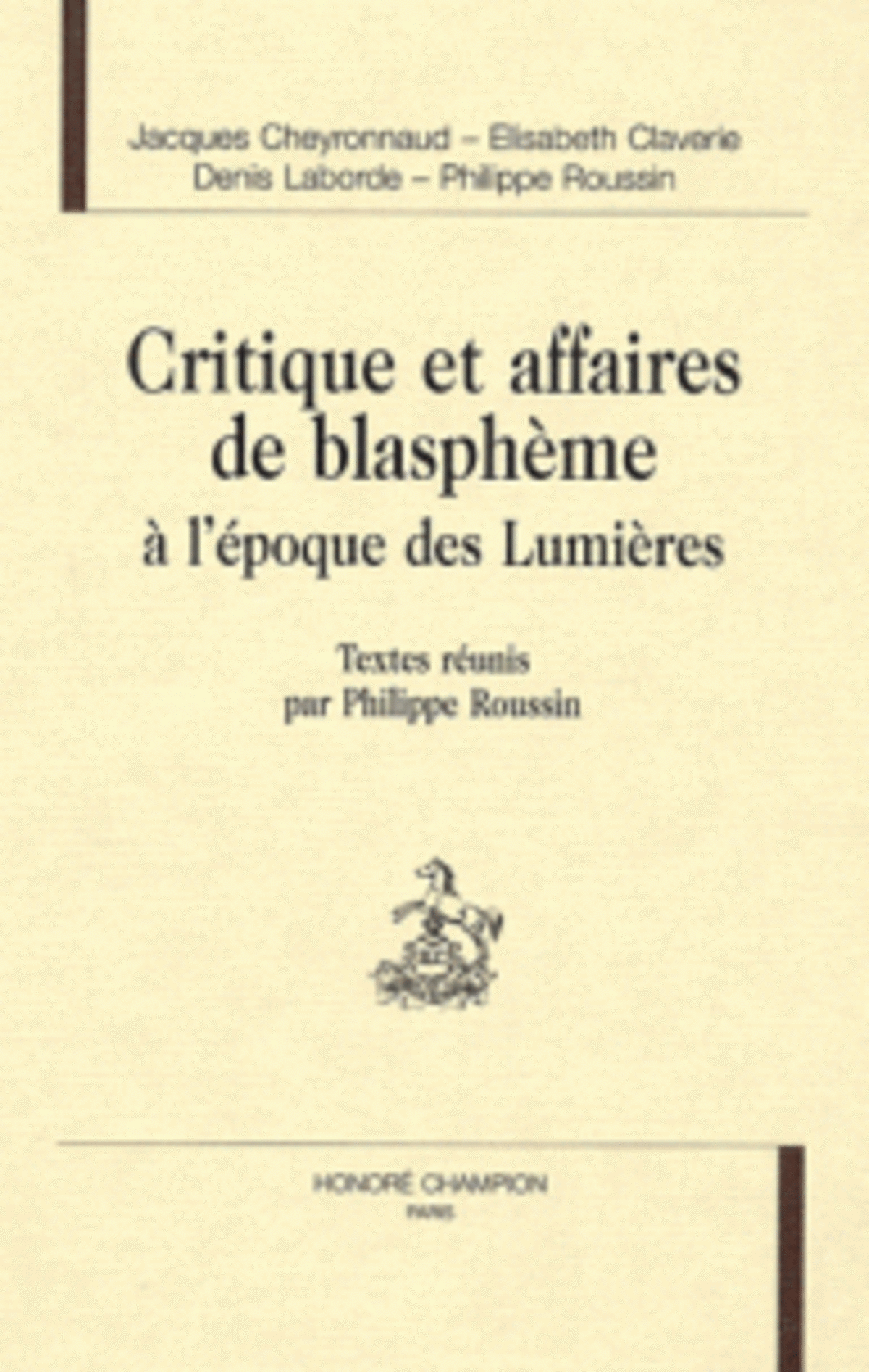
In France, and since Voltaire and Zola, it is what is called ‘an affair’, an imbroglio of meanings, an intrigue that questions the major collective issues: justice, the nation, secularism, religion, anti-Semitism (see Critique et affaires de blasphème à l’époque des Lumières, a 1998 work led by Philippe Roussin, published in France by Honoré Champion).
What turns a collective event into ‘an affair’? Neither the gravity of the event, nor the number of victims suffice to define it. Between July and October 1995, France was hit by eight terrorist bomb attacks which left eight dead and almost 200 wounded, without prompting either mass demonstrations or a major national debate. On the other hand, ‘affairs’ which have marked French history (the Calas affair, the Lefebvre de La Barre affair and the Dreyfus affair ), involved few victims but exemplified great issues. That’s the case with Charlie, which is a synthesis of all of France’s fears and unthinkable issues: identity, Islam, secularism, the republic, terrorism, colonialism, the banlieues [Editor’s note: France’s low-income city and town suburbs, often characterized by estates of subsidised housing where a strong proportion of the population are of immigrant origin], globalisation and, as was the case in the Dreyfus affair, this synthesis is of a chaotic and convulsive nature, with one-sided accusations, anathemas, excommunications.
That the French prime minister writes an opinion article to reply to the contents of a book by a thinker is both a confession and a symptom. A confession in that, by taking up the defence of 'the spirit of January 11’, the prime minister is claiming his copyright, an admission of paternity. A symptom in that to govern is no longer to take action, it is the control of perceptions. The job of political marketing is to group people together. It is not a question of visibility, but of engagement – to merge contradictory visions of the world, of mutually exclusive ideals, of irreconcilable expectations.
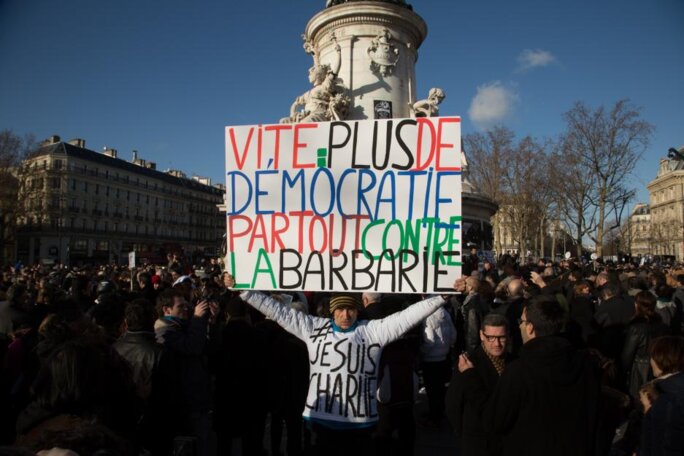
Enlargement : Illustration 2

'The spirit of January 11’ allows for a consensus among those centrifugal forces, inequalities and tensions at work in society. [French historian] Benjamin Stora, before [historian and sociologist] Emmanuel Todd, underlined during one of Mediapart’s regular live debates “the absence [among those who demonstrated on January 11th] of youngsters from the banlieues, an invisible France which doesn’t find itself in the national storybook that’s being written”. For just the length of a sunny Sunday, the January 11th demonstration hid what is, in [French Prime Minister] Manuel Valls’s own words, a “territorial, social and ethnic apartheid” that reigns in France.
2. A reverse Pentecost
Thanks to the general mobilisation decreed by the government, it was an operation of true sleight of hand that took place. Witness the restriction of freedom in the name of the defence of freedom, the bellicose statements made in the name of peace and civilisation, the stigmatisation of the enemy within, and the fifth column in the name of national unity, secularism made sacred and orchestrated against Islam, the acceptance of exceptional measures as being something normal (thanks to opinion polls), such as reinforcing police controls and surveillance in the very name of defending freedom of expression. While Manuel Valls extols the absolute right to say anything in all impunity, he puts before parliament a law to introduce mass surveillance.
Let’s be clear, ‘The spirit of January 11’ doesn’t clarify anything, rather it creates confusion. It is a reverse Pentecost which adds nothing in terms of knowledge, but brings only ignorance. It doesn’t reveal a hidden sense of something, rather it simply repeats the same symptoms that were seen in the US after the September 11 attacks; an increase in the military’s budget, a Patriot Act à la française, chauvinism and intolerance, manipulation of the collective emotion driven by the ambition of political re-election.
Régis Debray was right to warn about the dangers of McCarthyism in his essay in the Frenchmagazine Médium (and reproduced on Mediapart’s French pages). “The press, radio and TV have sent a moment floating across the country, relayed by the government who they were relaying (the usual circle), a generalised suspicion, some launching a hunt for traitors both declared and equivocal,” he wrote. “Intolerance preaches tolerance, it’s like the step of freedom for the enemies of freedom, a true classic. More troublesome appears to be the clean conscience bestowed by the unconscious.
‘We are at war!’ - we hear this more and more often and, like in all wars, there is a rush to designate those things that are sacred. Consciences are given frontiers. To each one their appreciation of what is sacred (to make sacred is to separate). The public debate is stamped with alignment. On the one side are the warmongers, on the other the surrendering appeasers. Over here they recruit the defenders of secular society, while over there they sign up others for jihad. Here the warriors of secularism, over there the objectors of the banlieues. Order and transgression, secularism and religion swap places. Impertinence transformed into an object of adoration. All sides declare their vision of what is untouchable.
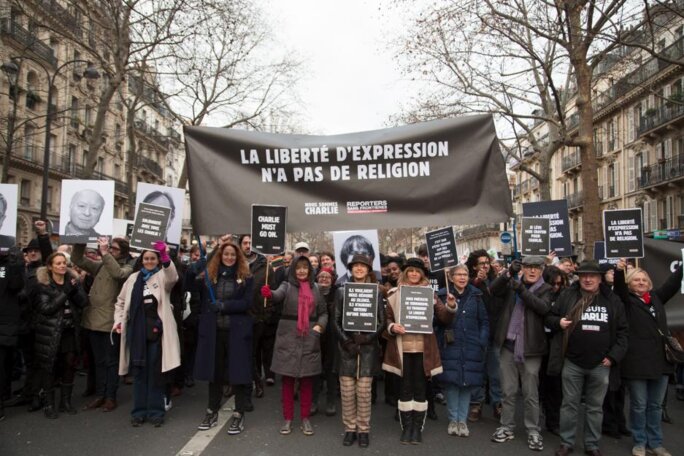
Enlargement : Illustration 3

3. The totem pole of free speech
Freedom of expression is in the process of becoming the new totem pole of a liberticidal society. The right to blaspheme, a state injunction. On the pediment of this unequal, liberticidal and very poorly fraternal Republic, a new motto is replacing the old one: ‘Liberty, Secularism, Blasphemy’. It’s all smoke and mirrors. Let us remind those who are unaware of it that the word ‘blasphemy’ has no equivalent in Arabic; the word ‘injury’ is closest.
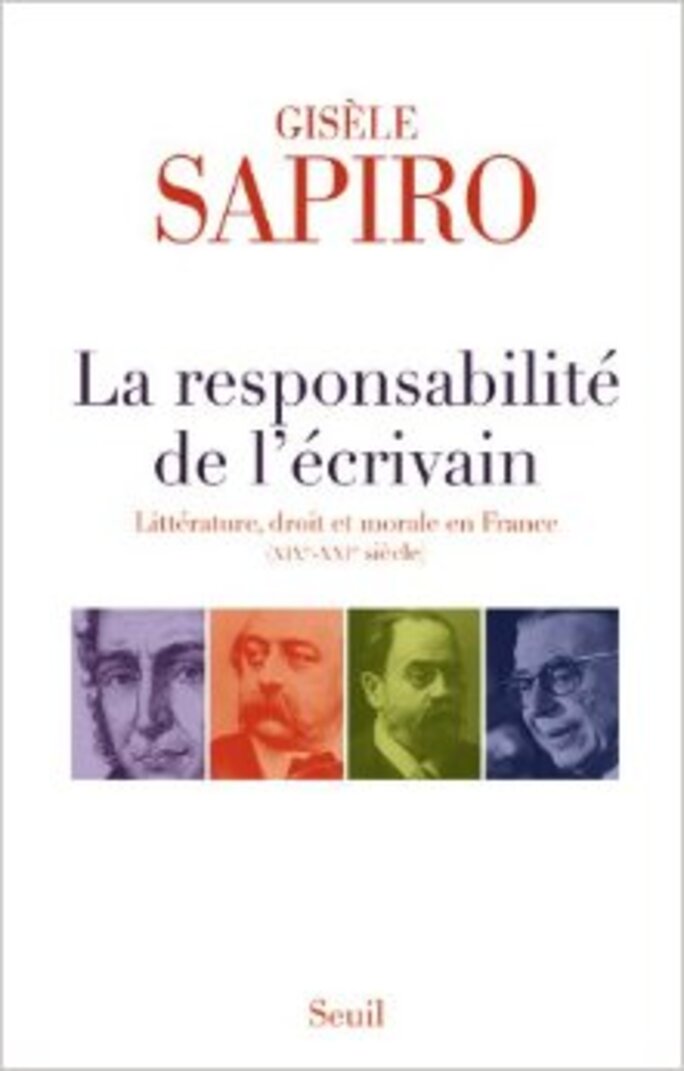
In his inaugural lesson at the Collège de France [a traditional text that describes a field of study and sets out a programme of research], French philosopher Michel Foucault wrote: “We know very well that we do not have the right to say any thing, that we cannot speak of any thing in any circumstance, that any one person cannot talk of any and every thing. Taboo of the subject. The ritual of circumstance. The exclusive right and privilege of the person who speaks."
Here we have there three types of prohibitions which form a web that envelopes just what expression is possible. In which human society are speeches and publications submitted to a greater control than our own? The right to free speech, like all rights, is not an absolute one. It is protected by laws, but which establish limits in order to do so. There is no freedom of speech without the bumper of responsibility.
Books began to have an author because the latter could be held responsible. Copyright not only provides an income for a writer, it also makes them legally responsible for their work. For those who are unaware that freedom of expression is anything but a natural right and rather a historical combat, one of progress and retreat, progression and regression, French sociologist Gisèle Sapiro’s book La Responsabilité de l’écrivain. Littérature, droit et morale en France, XIXe-XXIe siècle makes for highly recommended reading.
All the works of Michel Foucault illustrate that language is not a transparent and neutral thing, not a serene river whose course must not be altered by prohibitions, nor a place where tensions are played out and where politics are soothed.
The market of discursive exchanges is, more than other markets, unequal, subject to situations of monopoly. Because what is played out here is not the harmonious deliberation of well understood interests, but a jungle of desire and power, a war of words which has only intensified with the globalization of exchanges and the digital revolution.
4. The precedent that is the Salman Rushdie affair
The Rushdie affair, which is often cited as a precedent to the attack against Charlie Hebdo, was an inaugural event. It recorded our entry into a savage world where discursive exchanges were no longer regulated within limited linguistic spaces or homogenous cultures, but in the vast borderless world of the internet. A world where cultures that once ignored each other are opposed, of epistemics which belong to different centuries. The Rushdie affair was not a shock of civilisations, but a conflict of interpretations, a postmodern meeting of two epistemics. One is theological and political which recognises only the sacred text. The other is secular and which allows for the cohabitation of several types of text, not only the sacred and the profane, but also all sorts of texts of different cognitive status and diverse literary genres.
Among the numerous misunderstandings that marked the international campaign in favour of Salman Rushdie, two errors which retrospectively throw a light on the debate surrounding the Charlie Hebdo events should be underlined. The first of these concerns the statute of the author and the nature of his fault, the second is that The Satanic Verses was “a love song” for emigration but was burnt by emigrants.
During the international campaign in favour of Salman Rushdie, numerous people defended him in the name of freedom of expression, with the argument that a writer can say anything, and that he even has the right to blaspheme. That was tantamount to taking up the argument of the writer’s opponents, and to deny the very idea of a particular literary space, of a language of fiction that does not have the same legal or moral implications as those of a political or religious opinion expressed in the public place.
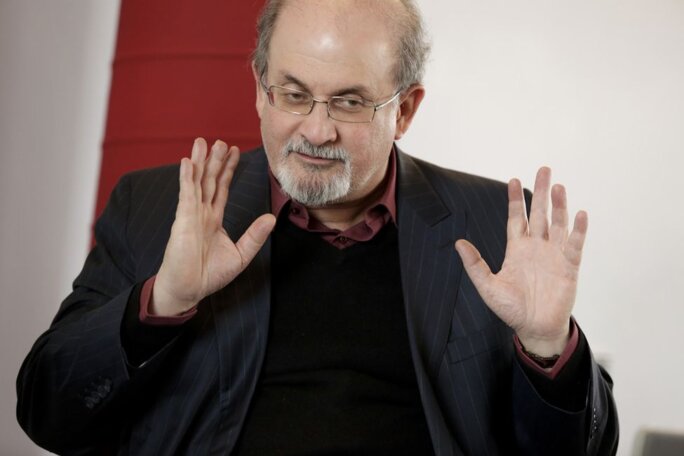
Enlargement : Illustration 5

It is a banal element of literary theory, but it had to be underlined for ten years. There is something in a novel that does not stem from the opinions of its author. If there is indeed something that the fatwa issued against Rushdie taught us, it is the importance of certain theoretical bearings. The distinctions between author, narrator and characters, which were the pons asinorum http://en.wikipedia.org/wiki/Pons_asinorum of literary studies, were given a brutal update by the fatwa, and which was even quite staggering. I can personally recount that feeling of incredulity, having organised several debates about these questions with Salman Rushdie in meeting halls surrounded by police and under the close guard of members of the gendarmerie’s commando group, the GIGN. We were stepping into the unknown – talking about literature under police protection! Into what fictional world had we arrived?
Great works are recognised by their troubling of minds: not because they have the purpose of the explicit, obscene transgression of what is prohibited or is taboo, but through a change of perception, an upheaval of the senses. They obscurely endeavour to search for new angles with which to penetrate reality, and fight for another hierarchy of meaning, other forms of subjectification. It is on that level that they should be defended. That is why, at the beginning of the 1990s, we created the International Parliament of Writers, not only to bring help to writers and artists who, in Algeria or Iran, were threatened with death by fundamentalist groups, but also to establish the recognition of an unwritten right, the right to fiction, the right to literature.
Michel Foucault proposed distinguishing between the prohibitions that are directed against an explicit content (“the religious series of blasphemous words”), the prohibitions that are directed against forms of language which are considered to be transgressions (“not in their meaning, not in their verbal makeup, but in their play”). In this category, how can we not recognise, from Sade to Joyce and on to Rushdie, from Rabelais to Céline and on to Genet, the denied place, literature’s place of no right. The fatwa against Rushdie was not the punishment of a crime of opinion (taking up his defence, therefore, was not an issue about freedom of expression) but that of a novel. Not only Rushdie’s book, but the Romanesque genre itself. There is no Rushdie without Bulgakov, Kafka, Sterne or Rabelais.
6. The Satanic Verses, a love song to emigration
If, as [French philosopher] Gilles Deleuze wrote, one of the functions of fiction is to invent “a people who are missing”, it is the birth of a people that we find in The Satanic Verses. A people of immigrants, torn between the side of London and the side of Bombay, a people of translated individuals, because they were displaced beyond their origins and whose values and identities show themselves to be porous before becoming mixed and contaminated. Bombay becomes post-modern, while London becomes creolised.
The Satanic Verses is the first great carnivalesque novel of the post-modern era. There is in Rushdie’s work a mise en abyme of identity, whether this be national identity, religious identity or ethnic identity. In other words, the fundamentals of fundamentalism – of all fundamentalisms. It is against this troubling of the issue of identity that the fatwa against Rushdie attracted adepts, and not only in Tehran.
The book made exile into a decisive experience that allowed a new exploration of reality, the discovery of a new world. How can one enter, penetrate, into a world that is completely open? How can one come into a world when one belongs to several worlds? How is one born when one is a migrant? How does one incarnate and singularise oneself in a world where all identifications are equivalent and equally possible? The novel reconstituted an immigrant’s vision of the world. It explored the conflicts and the contradictions which immigration brings, and above all the upheavals of changes of perception, the new relationships with time and space, but also with the body, with sexuality, culture and religion.
Rushdie’s novel was intended as a love song to emigration, to racial mix, to the baroque nature of modern life. It was this formal, structural work that was targeted by a fatwa - not the right to blaspheme, as presented by the media, but the right to invent possible worlds.
7. Romanesque relativity and creative hospitality
When, at the International Parliament of Writers, we created a network of safe havens, the International Network of Cities of Asylum for writers threatened with death in their own countries, we used all kinds of metaphors. For [Nigerian playwright ] Wole Soyinka, it was an ecosystem which allowed to sow seeds upon favourable soil. For [French thinker] Jacques Derrida, who wrote a book on the subject (Cosmopolites de tous les pays encore un effort!) it was the laboratory of a new citizenship, of a new hospitality. [French Caribbean writer and poet] Édouard Glissant described them as “town sanctuaries for the world’s voices”.
The liberty of expression that we have to defend cannot be discriminating or offensive. Those who take hold of one or the other to stigmatise and to exclude not so much a religion but rather a culture, should not count upon the comprehension of complicity of writers. In his essay The Day Panurge No Longer Makes People Laugh, published in the Critical Quarterly, Milan Kunderaz wrote: “We must stress this: there is no place for hatred in the relativistic universe of the novel: the author who writes a novel in order to settle scores (personal or idealogical) is headed for total and certain aesthetic ruin.”
Kundera underlined the paradoxes of relativity in Rushdie’s novel. Western modernity is viewed with scepticism, the portrait of the immigrant Imam contains a comprehension that is almost respectful, while leftists appear as frivolous as the frivolity they denounce. “No-one is right and no-one is entirely wrong in this immense carnavel of relativity that is this work,” wrote Kundera.
In another passage of the same article, Kundera recounts how his concept of secularism was transformed under communism, and how a certain triumphant atheism appeared ridiculous to him with regard to his oppressed Christian compatriots. “I was raised an atheist and that suited me until the day when, in the darkest years of Communism, I saw Christians being bullied,” he wrote. “On the instant, the provocative, zestful atheism of my early youth vanished like some juvenile brainlessness. I understood my believing friends and, carried away by solidarity and by emotion, I sometimes went along with them to mass.”
It would be pleasing to see some of our secular standard-bearers have the same regard towards Muslims.
-------------------------
Christian Salmon is the author of Storytelling: Bewitching the Modern Mind, published in English by Verso (reviewed by The Washington Post here).
-------------------------
- The French version of this article can be found here.
English version by Graham Tearse


